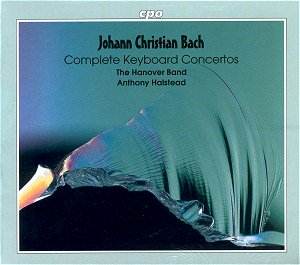Johann Christian was the youngest son of Johann Sebastian
Bach and his second wife Anna Magdalena. While he was a major composer
of his time, he is best known today for his friendship with Mozart,
who even reworked several of Johann Christian's piano sonatas as concerti.
A composer of instrumental music, such as these keyboard concerti, Johann
Christian Bach also wrote several opera seria. He was criticized for
abandoning his father's musical style and religion (he converted to
Catholicism), but his music fits in perfectly with the classical style
and idiom.
Nevertheless, his music can be facile and predictable.
The harpsichord solo in the opening movement of his first concerto belies
this lack of depth. Johann Christian was no amateur, yet his music often
sounds as though it was written more as musical wallpaper than as demanding
music. Totally unlike the music of his father, this composer can be
seen as a sub-Mozart. The opening movement of his sixth harpsichord
concerto, before the keyboard takes a solo, sounds like so many Mozart
concerti or overtures, that one could easily mistake the two composers.
Oddly enough, only three of these concertos are in
minor keys, and they are all among the earliest works (though naturally
some of the internal movements of the concerti are in minor keys). Why
did Johann Christian Bach not like the minor key? Could it be that he
was not suited for the type of drama and emotion this key often suggested?
His F minor concerto (one of the Berlin concerti) shows that this is
not the case - in fact, this concerto seems to have much more melodic
invention than many of his other early works. But the middle, slow movement
is dense and heavy, and perhaps he preferred the lighter sound of the
major keys.
The music gets better as Johann Christian develops
more experience. His piano concerti are far superior to the harpsichord
works, though, again, they sound like a pale copy of Mozart's works.
But he knew all the tricks of the trade, using a masterful interplay
between the soloist and orchestra, though, in the end, these sound more
like musical pyrotechnics than melody.
Anthony Halstead and the Hanover Band do their best
to bring this music to life, though I remain unconvinced. Halstead's
performance in the harpsichord concerti is more than competent, and
the balance between the keyboard and orchestra is ideal. His performance
on the pianoforte are excellent, and the orchestra sounds more convincing
in the later works, almost as if the musicians are uncomfortable with
the lighter sound of the harpsichord. The tempi are often energetic,
and there is a good amount of drive. But the pianoforte is often miked
strangely, giving it an odd position in the soundscape, a bit too far
forward. It should be noted that the violins are often very present,
and the first and second violinists have roles that make them almost
soloists as well. Their performances are very good, giving a very attractive
sound and overall texture.
While Johann Christian Bach was the most famous of
Bach's sons during his lifetime, his music is neither as challenging
nor as original as that of Carl Phillip Emmanuel Bach. It is often attractive,
and sometimes interesting, but remains the kind of music that all sounds
the same. The similarity with Mozart's music is apparent, and Johann
Christian lacks the uniqueness to make any of these works unforgettable.
But the recordings and performances are excellent,
so if you are looking for some Mozart-like music to broaden your horizons,
this would be an excellent choice.
Kirk McElhearn

